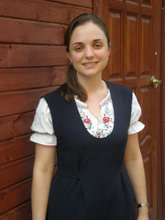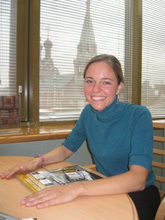
True love knows no restriction of time and space.� And the same may also be said of love for one's homeland.� Katya Barlow of Sydney and Natasha Zelenskaya of Washington are separated from the Imperial Russia of their great-grandmothers by nearly a whole century and two oceans.� Not only they themselves, but their parents and grandparents were born outside the boundaries of Russia; yet they preserved its image within themselves.� �
 Katya Barlow, a student at the pedagogical faculty of Sydney University: "A Part of Me Belongs to Russia"� Katya Barlow, a student at the pedagogical faculty of Sydney University: "A Part of Me Belongs to Russia"�
I am from Australia.� I live in Sydney, and am studying French and Italian.� When I complete my degree I will be a teacher of foreign languages.� My father is an Australian; my mother is Russian.� My grandmother was already born in Yugoslavia, and grandfather in Rostov-on-the-Don.� They became acquainted in a DP [Displaced Persons�transl.] camp in Austria.� Ultimately, they moved to Australia, where my mother was born.�
�Did you know Russian from childhood?�
�With my grandparents I spoke Russian.� And at home I did so with my mother, although there were difficulties, since my father, an Australian, did not speak Russian.� But on Saturdays we went to the Russian school, where I learned Russian language, history, literature.�
�A missionary trip through the Egoriev region near Moscow was your first visit to Russia?�
�I first traveled to Russia with my family eight years ago.� At that time I experienced a sense of peace in my soul.� And now we are very pleased to have resided in the Kolychevsk Monastery, where Matushka Maria and Mother Agnes have received everyone with open arms.� We socialized a good deal with young people.� We live far away, in Australia, and for this reason the bond of faith with young people from Russia is very important for us.�
�And what is Russia in your life?�
�I am an Australian; but my ancestors were from Russia, and our family history is bound up with Russia.� Part of me belongs to Russia.�
 Natasha Zelenskaya, a graduate student of music, in Washington, USA: "The main thing is to maintain Russianness in language and hospitality."� Natasha Zelenskaya, a graduate student of music, in Washington, USA: "The main thing is to maintain Russianness in language and hospitality."�
My great-grandmother was from Moscow; her family was from Kostroma.� She became acquainted with my great-grandfather during the Civil War, during which she worked as a nurse.� Her family converted one of their homes into a hospital, where they tended wounded soldiers.� They left Russia with the Army of General Wrangel, crossing the Black Sea to Constantinople.� There my grandfather was born, and after a few years they moved to Belgrade.� My grandfather grew up in Belgrade and there finished Russian high school.� During World War II, they again became refugees, leaving everything behind to escape the Soviet army and Tito.� Thus, they found themselves in a DP camp in Germany, and ultimately in New York, because President Truman made it possible for the DP refugees to relocate to the United States.�
My grandfather on my father's side was born in 1907.� He studied in a cadet academy, though I don't remember where.� When the Revolution happened, the academy was disbanded and all the children had to make their way back to their parents.� It was a horrible time for those little boys.� I don't remember what happened with him. The family left Russia just them.� At first they lived in Zagreb, but later moved to Saltzburg, where there was a large DP camp.� There he met my grandmother.� I was a year old when grandfather died, but in my eyes he was a hero.� He forged passports for Russian refugees so they would escape being repatriated; he printed Russian newspapers��
My father was born in California, and mother in New York.� But when they were still children their families both moved to Washington.� There my parents met, and there I was born.� I have always considered myself fully American.� My first language was Russian, my family is Russian.� And we always had Russian society around us:� this included scouts, Russia school, balls.�
�Balls?�
�Yes, we all went to balls.� Grandmother taught me to dance�waltzes, foxtrots, polkas.�� People from age sixteen on up to those who were quite elderly were invited to the balls.� Russian society organized them.� To put it briefly, our bond with Russia was never broken.� Church, spirituality, grandmother, grandfather, literature, famous authors, balls.�
�When did you travel to Russia for the first time?�
�I lived in America until I was seventeen.� And only when I reached that age, in 1994, did I travel to Russia, to a scout camp on the Black Sea near Anapa.� I have to say frankly that my first impression was that the people had to endure a great deal; it was difficult for them,; therefore, I did not sense any warmth.� But when we visited the homes of acquaintances, I saw how they covered the table with everything they had, they gave us everything.� But on the street it was a different matter.�
�That is, it was a different Russia, not the one you had pictured to yourself from childhood?�
�For my generation Russia was probably something quite abstract.� It seems to me that if I had asked grandmother and grandfather, they would have given a different answer.� For me, Russianness, Russia, is something familial, that is "going to grandma and grandpa's", "the Russian Church," something difficult to put into words.� It is the soul.� When we meet other Russians, a sort of bond immediately arises among us.� I can't explain, but it is so.� We sing songs��
�Interesting.� What sort of songs do you sing?�
�Most of the songs I learned in scout camps.� They are songs of the scouts, of the emigres, of the White Army.� They are beautiful, serious songs.� "Let the bullets whistle by, let the blood flow�"�
�"O God, preserve the Tsar�"?�
�All of my generation knows it, but we no longer sing it.�
�And the grandmothers?�
I never noticed that grandmother sang it, but she always said that it was sung.� In New York, in the '50s, whenever there was a program, all the emigres would stand and sing "God, preserve the Tsar."� My generation reads less in Russian.� We sing songs, but far from understand all the words.�
�A question that all journalists pose and that is very difficult to answer: Whom do you feel yourself to be?�
�An American, but with a Russian soul.�
�How do your American friends relate to you?� Do they treat you as one of their own, or as someone foreign?�
�I am already at university.� But I remember when I was in middle school when I was 10-11 years old, feeling myself to be a little foreign:� "Why do you celebrate Christmas on a different day?" "What's this strange food, borshch?" "You have such an unusual name"��
�Natasha, what is Russia, Russianness, for you?�
�I feel that the most important this is the Russian language.� My grandparents drove to our house twice a week to give us lessons.� I would like that my own children�God grant�will also speak Russian.� My husband is an American; he studied Russian at university for two years; but even so he doesn't speak Russian fluently.� We would like for our children to speak Russian.� It seems to me that this is the ultimate, genuine bond.�
Of course, the Orthodox Church is also important.� Although at this time I attend services that are served in English, and have understood that for me Orthodoxy is not Russian, but first and foremost a religious identity.� I was baptized in infancy; all my life I have attended church; but the bond was always not so much religious as cultural.� With the church were connected both the scouts and the Russian school.� And all my Russian friends who lived in Washington went to the Russian church.� This means that this was not only a religious phenomenon, but also a cultural one.� But ever since I married an American from Texas, and he converted from Protestantism to Orthodoxy, and we began to attend English-language services together, I have become aware that Orthodoxy is greater, and deeper, than any national bond.�
�What of Russia do you want to transmit to your children?�
�It seems to me that the main thing is to preserve Russianness in language and hospitality.� When guests come to us, we always give them everything.� And I would also like to preserve the music, the Russian melodies, the beautiful words.�
The interviewer was Alexandra Nikiforova. |